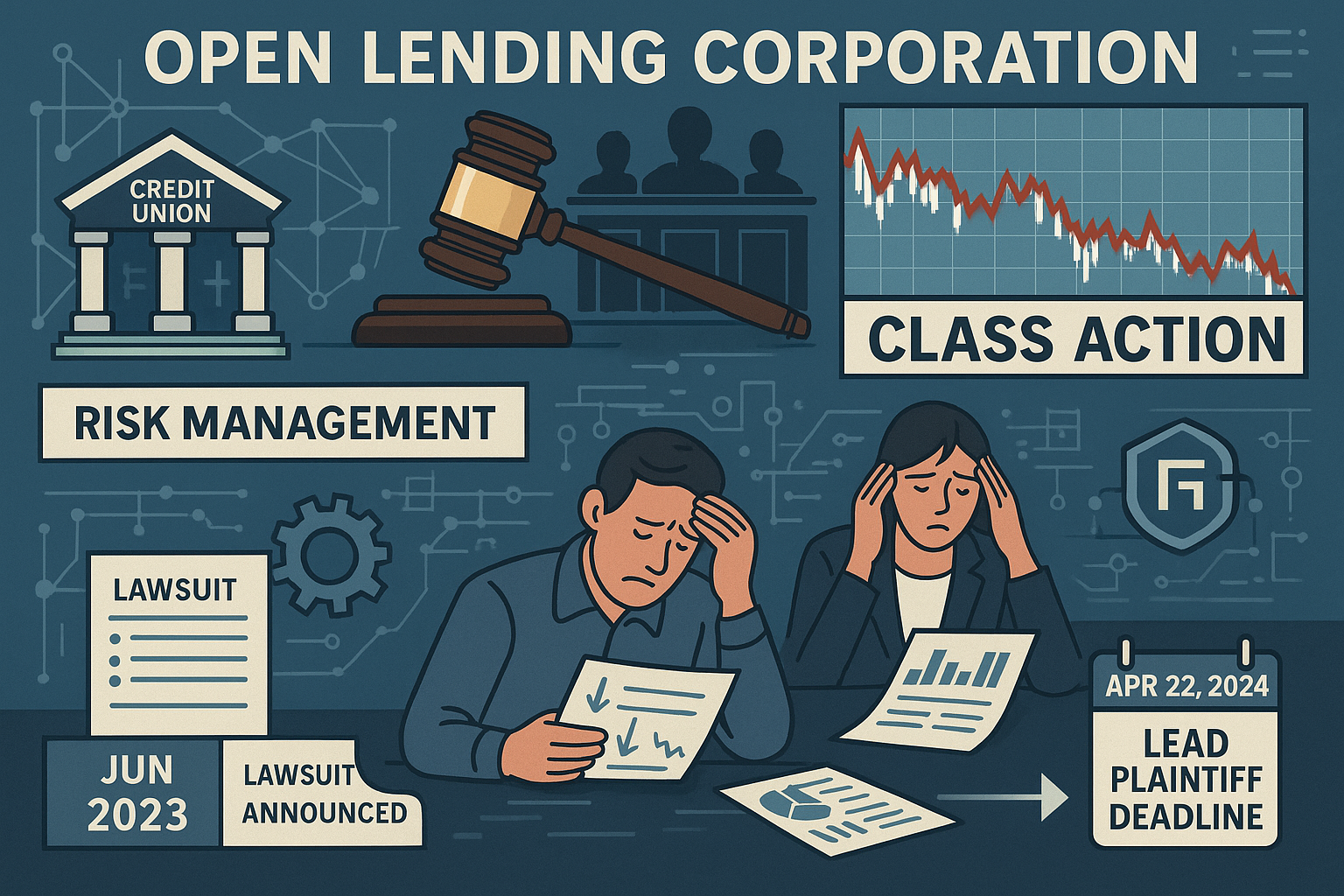Open Lending Corporation Class Action: What Credit Unions Need to Know and How to Navigate the Legal Developments
Open Lending Corporation Securities Class Action: Key Developments and Implications for Credit Unions
On May 12, 2025, The Gross Law Firm announced a class action lawsuit on behalf of shareholders of Open Lending Corporation (NASDAQ: LPRO), with a critical lead plaintiff deadline set for June 30, 2025. The case centers around allegations that Open Lending misled investors between February 24, 2022, and March 31, 2025, a period that saw significant volatility for both the company and its stakeholders. For credit union executives whose organizations have direct or indirect exposure to Open Lending’s products or services, the lawsuit’s developments warrant careful attention.
Background: Open Lending and Its Relationship with Credit Unions
Open Lending Corporation is a provider of loan analytics and risk-based pricing solutions, serving credit unions, regional banks, and finance companies. Its flagship Lenders Protection platform enables financial institutions to offer auto loans to near-prime borrowers with insurance-backed risk mitigation. This technology-driven approach has been especially attractive to credit unions seeking to expand into non-prime lending while managing risk exposure.
The class action complaint alleges that Open Lending’s leadership misrepresented the effectiveness of its risk-based pricing models and issued misleading statements about its profit share revenue, key metrics that underpin the platform’s value proposition to credit unions according to the case summary from Robbins Geller Rudman & Dowd LLP. Furthermore, the suit contends that the company concealed material declines in the value of certain loan vintages, including those from 2021, 2022, 2023, and 2024, severely impacting the reliability of the lending enablement program.
Allegations at the Core of the Lawsuit
The formal complaint, part of the Bradley v. Open Lending Corporation litigation in the U.S. District Court for the Western District of Texas, accuses Open Lending and several current and former executives of breaching the Securities Exchange Act of 1934. The specific allegations include:
- Overstating the capabilities and effectiveness of Open Lending’s proprietary risk-based pricing models.
- Making materially misleading statements regarding reported profit share revenues.
- Failing to disclose that the 2021 and 2022 loan vintages had become worth less than their outstanding balances, creating an asset-liability mismatch.
- Underreporting the underperformance of 2023 and 2024 loan vintages, further inflating investor expectations.
These alleged misrepresentations led to artificially inflated share prices, ultimately damaging investors—including institutional credit union shareholders—when the truth emerged.
Recent Financial Disclosures and Market Reaction
On March 31, 2025, Open Lending reported a dramatic year-over-year increase in its net loss for Q4 2024. The loss was largely tied to the recognition of a valuation allowance on deferred tax assets, which spiked the company’s income tax expense. In addition, the company announced significant leadership changes. These disclosures contributed to a sharp 57.6% drop in Open Lending’s share price, closing at $1.17 per share on April 1, 2025 as noted by Faruqi & Faruqi LLP.
Just prior, on March 17, 2025, the company revealed it would not file its 2024 Annual Report on time, citing the need for additional scrutiny of its profit share revenue and related accounting practices. This triggered fresh concerns about the transparency of Open Lending’s financial reporting according to the Law Offices of Frank R. Cruz.
Lead Plaintiff Process and Next Steps for Shareholders
The “lead plaintiff” in a securities class action is typically the investor with the largest financial interest who can adequately represent the class. Appointment as lead plaintiff is not mandatory for participation; shareholders remain eligible to share in any potential recovery regardless of their role as explained by Faruqi & Faruqi LLP. Any credit union, fund, or individual who acquired LPRO shares during the class period is encouraged to register via the Gross Law Firm or other participating firms to preserve their rights and receive case updates. Upon registration, shareholders are enrolled in portfolio monitoring software for timely status communications.
The deadline for seeking lead plaintiff status is June 30, 2025. There is no obligation or cost to register or participate as part of the class.
Implications for Credit Unions
Credit union executives should assess their institution’s direct investments in Open Lending securities and scrutinize any exposure through pooled investment vehicles. Additionally, because Open Lending’s platform is embedded in the loan origination and risk management strategies of many credit unions, questions around the integrity of the company’s analytics and financial strength may necessitate enhanced due diligence and contingency planning.
This matter also offers a broader lesson on third-party risk: Fintech partners’ stability and transparency are critical, particularly when they serve as a bridge into new lending segments or risk profiles. Monitoring litigation, financial disclosures, and regulatory actions involving such partners is essential for prudent risk management.
About The Gross Law Firm and Other Involved Counsel
The Gross Law Firm is a nationally recognized class action practice specializing in securities litigation, investor protection, and corporate accountability. Their stated mission is to protect shareholders harmed by corporate misconduct and to enforce higher standards of business ethics and transparency as described in their official notice. Other prominent firms, including Faruqi & Faruqi LLP, Bernstein Liebhard LLP, and the Law Offices of Frank R. Cruz, are also representing investors in related actions according to updated advisories.
Conclusion
The Open Lending Corporation class action underscores the intertwined nature of technology vendors and the credit union sector. For institutions leveraging fintech platforms for loan growth, ongoing litigation and financial disclosures such as those involving Open Lending should prompt a holistic review of vendor risk and investor exposure. Credit union executives with a stake in LPRO or reliance on Open Lending’s technology are urged to consult with counsel and stay engaged as legal proceedings unfold and new information emerges.
To review your eligibility or register for the class action, please visit the Gross Law Firm’s submission portal.


